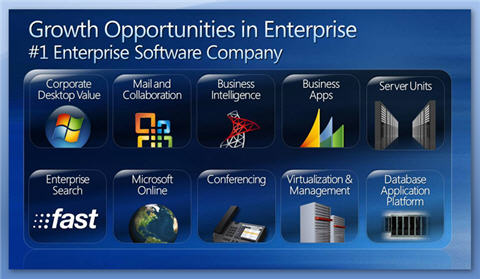Microsoft may need an IBM moment of clarity

Microsoft's financial analyst meeting was a tale of a technology conglomerate: You heard a lot about search, a decent bit about the enterprise and all sorts of projects in between.
But amid all the coverage--see Mary Jo's laundry list of stories--I can't help but wonder if Microsoft's various ventures aren't diversions that take away from the real profit potential of the enterprise business.
Instead of chasing Yahoo, plotting to be an advertising empire and pining for consumers with things like the Xbox and Zune perhaps what Microsoft really needs is an IBM moment of clarity. Remember IBM? Big Blue used to do everything too, but then it suddenly got it. IBM unloaded its PC business to Lenovo and started focusing on the two things that were insanely profitable: Software and services. Oh yeah, the hardware is still there too, but IBM is all about enterprise and helping business get stuff done.
IBM's public persona may have taken a hit with the average consumer--it's not like Tivoli, Rational and IT services are discussed at picnics--but there's no question it made the right move. IBM is more profitable than ever. And it's focused.
Microsoft could use some of that focus. It's not that Microsoft is forgetting the enterprise business. In fact, Microsoft is hellbent on being the No. 1 enterprise software company. The problem: That enterprise windfall is funding things like Live Search and Xbox. I credit Microsoft for its willingness to invest and be tenacious, but you have to wonder about the returns here.
The bridge from Windows to becoming an enterprise company made more sense. Listen to Microsoft's online media ambitions for a while and you can't help but wonder if the DNA is there to succeed. As you mull over all the Microsoft presentations one thing sticks out: Execs talked about the enterprise and came across as authentic. The ad-search-consumer pitches were missing something--an institutional knowledge if you will. Microsoft is a software company not a media property.
And it's not like the enterprise thing is lacking opportunity. It's not a stretch to see Microsoft punching Oracle and SAP in the mouth at some point. Microsoft is a big enterprise application player in smaller and mid-sized businesses. Those businesses tend to grow up to be big enterprises. If Microsoft apps grow up with enterprises Oracle and SAP may not have the lock they have always enjoyed.
In Ballmer's presentation he said:
"We see the most fantastic growth opportunities of all time in the enterprise. Desktop value, mail and collaboration, business intelligence, business applications, the server market despite virtualization is still exploding, enterprise search, the move of enterprises to host their infrastructure in the cloud that we call Microsoft Online, conferencing and IP telephony, management, virtualization software, the database and database application platform. I think palpably we are about this close, Microsoft, able to claim that we're the number one enterprise software company in the world, which nobody would have been able to say 20 years ago, and yet we see nothing but opportunity."
Why shouldn't Ballmer be enthusiastic about the enterprise? Look at this lineup:
Take that lineup and hook it up to the cloud and you have the future.
And guess what? Ads aren't going to support the enterprise business--or Windows for that matter--so how critical is chasing Google?
Naturally, Ballmer went back to yapping about Live Search and talking ads. Ballmer's overriding message was that Microsoft is prepared to tackle technology shifts--and the biggest one is the Internet and how everything will be connected via services.
Ballmer added:
The truth is, we get new opportunities. Today when we sell software, say, to an enterprise customer, we hand them a CD, and they go instance it. If we are instead running that server for them, if we're providing operations support, we see the opportunity not only to monetize the IP that would have been in the software license, but also to derive additional margin from the value add of being able to provide service-level agreements, and guarantees, and support. And see our overall sort of pool of opportunity increasing. We're the only player in this market who is building the future based on the present. We're building off of the strong enterprise presence we have, and moving those things to the cloud.
All of that makes a ton of sense. What is questionable is Microsoft's forays into other markets where it may not have a clue. With Microsoft's billions of dollars the primary attitude is to shrug off big investments like the Xbox, Live Search and media properties, but a little focus--ideally on the enterprise--could create a lot more value. Are the thin profit margins on the Xbox--relative to software-- really worth the effort?
Consider the entertainment and device division:
Vs. the business division:
No matter what Microsoft does forays into gaming devices won't be as profitable as enterprise software. Was that a route worth taking? As Ballmer ponders world domination he may want to dust of the playbook from IBM's Lou Gerstner and Sam Palmisano. It's not as glorious as catching Google, but it's arguably more effective--and certainly more profitable.
